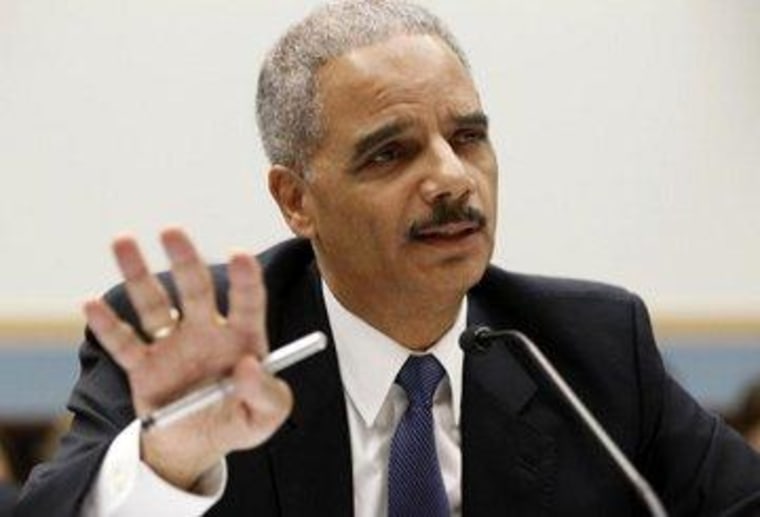In the wake of the U.S. Supreme Court's ruling on the Voting Rights Act, Republican policymakers acted with remarkable speed -- literally, less than 24 hours -- to approve new voting restrictions, most notably a controversial voter-ID law.
When the Voting Rights Act was intact, changes to voting laws in the Lone Star State would need to be cleared with the Justice Department in advance of being implemented, but with the law gutted by a narrow Supreme Court majority, GOP officials in Texas assumed the Justice Department is no longer relevant, and they could do as they pleased.
The nation's Attorney General apparently believes otherwise.
Despite the Supreme Court's ruling in late June that weakened the Voting Rights Act, Attorney General Eric Holder says the Justice Department will use what's left of the law to go after what it considers discriminatory practices.And the first target will be Texas, in a dispute over new boundaries drawn by the Republican legislature for congressional and legislative districts.Holder told National Urban League this morning that the Justice Department's Civil Rights division will urge a federal judge in Texas to subject the State of Texas to a pre-clearance regime similar to the one required by Section 5 of the Voting Rights Act -- a part of the law that survived the Supreme Court's ruling.
It's not that Holder is ignoring the Supreme Court's ruling; it's that Holder believes the ruling still leaves him some room to maneuver. "We believe that the State of Texas should be required to go through a pre-clearance process whenever it changes its voting laws and practices," the A.G. said.
What's the basis for this? We'll know more as the process unfolds, but it appears that the Justice Department believes that under the remaining provisions of the VRA, when "intentional voting discrimination" is found, these changes to voting rights cannot be permitted to continue.
And because Texas' voter-ID law is very likely predicated on discriminatory grounds, Holder wants a federal court to intervene now -- before voter suppression can begin.
As the Austin Statesman reported this morning, the Justice Department's move "marks the first federal action connected to voting rights" since the Supreme Court's ruling, though as Holder added this morning, "It will not be our last."
So, does the case have a credible shot?
The A.G. probably wouldn't be pushing this if he didn't think he has a reasonable chance of success, and as Ian Millhiser noted, Texas' efforts at voter suppression are very familiar to Holder and his team.
As Holder notes in his remarks, Texas is a particularly strong candidate for such federal supervison due to "the evidence of intentional racial discrimination" in Texas that the Justice Department presented to a federal court last year. Among other things, this federal court found that Texas Republicans charged with drawing the states' legislative maps "consciously replaced many of [a] district's active Hispanic voters with low-turnout Hispanic voters in an effort to strengthen the voting power of [the district's] Anglo citizens. In other words, they sought to reduce Hispanic voters' ability to elect" a candidate of their choice.
It's safe to say voter-suppression proponents in other states -- cough, North Carolina, cough -- will be keenly interested in the outcome of this case.
